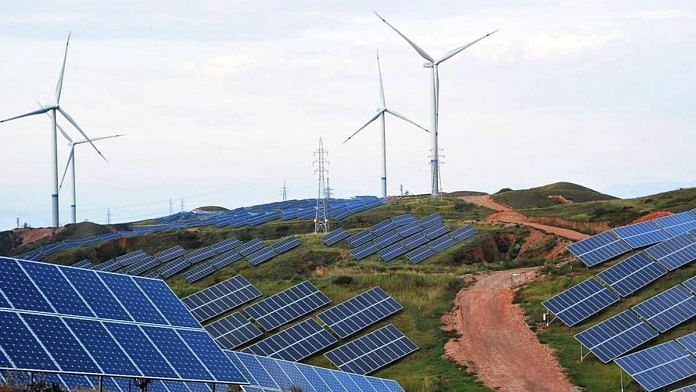New Delhi: Even as global stocks have slumped sharply since Russia’s invasion of the Ukrainian territory (US stocks fell by 8 per cent last Thursday, the worst annual start since 2009), the renewable energy sector has been a stand-out, media reports have shown. For the first time since the pandemic began in 2020, the European Renewable Energy Index surged nearly 9.3 per cent last week.
This index tracks performances of active European companies, working in the renewable energy sectors, such as solar, water, biofuels, marine, wind and geothermal. It focuses on the largest companies and those with the most liquid stocks.
The robust performance of the renewable energy stocks, as reported by major market websites, is the result of European nations seeking to distance themselves from Russian oil and gas supplies.
Russia is the third-largest oil producer in the world, contributing about 10 per cent of the annual global output. About 40 per cent of Europe’s natural gas needs are met by Russia.
Also read: India’s renewables boom set to lift power exchange spot trading, says Indian Energy Exchange
Germany’s new renewable energy policy
On Monday, Germany’s economy minister Robert Habeck reportedly announced plans for a diversification towards renewable energy. Europe’s largest economy has now set a target of 2035 to move completely to renewable sources like wind and solar energy for all its electricity requirements, from the earlier target of giving up its dependency on fossil fuels by 2040.
A draft amendment to Germany’s Renewable Sources Act will be pushed to be enforced before winter sets in, said the country’s economy ministry. If it is a success, Germany is likely to double onshore solar and wind energy capacity to 110 gigawatts (GW) from 52 GW and 54.4 per cent GW respectively.
According to Gautam Mohanka, who runs the Indian solar panel manufacturing firm Gautam Solar, and understands the market in the sector, “Everyone understands that you can’t rely on other nations for essential things like energy because, as the Russia-Ukraine crisis has shown, anything may happen at any time. Germany has promised to adopt renewable energy entirely and it is important to invest in renewable energy now.”
How the rest of the world is reacting
Last week, the stocks of some major US solar energy companies, like Sunrun Inc. and Sunnova Energy International Inc., rose close to 14 per cent in intraday trading. Sunrun Inc. is one of America’s largest residential manufacturers of solar panels and home batteries, and is headquartered in San Francisco.
The rise indicates how investors are open to diving into the renewable energy sector, as it remains one of the biggest options for the US to move away from its dependency on Russian fossil fuels.
A slew of American and European energy companies, with arms in Russia, have already accepted losses, and have laid out plans to leave.
UK-based company Shell, which had been in collaboration with Russia on Sakhalin-2 — one of the largest integrated oil and gas projects — announced its departure from the joint venture Monday. The project had also included the Russian company Gazprom.
Shell left a “27.5 per cent stake in the Sakhalin-2 liquefied natural gas facility, its 50 per cent stake in the Salym Petroleum Development and the Gydan energy venture. Shell also intends to end its involvement in the Nord Stream 2 pipeline project,” the statement said.
Shell’s chief executive officer, Ben van Beurden, was quoted in the same statement as saying, “We are shocked by the loss of life in Ukraine, which we deplore, resulting from a senseless act of military aggression which threatens European security. Our decision to exit is one we take with conviction.”
Other changes
Norwegian oil and gas company Equinor and British firm BP also made similar changes. The latter claimed on its website that it “will exit its 19.75 per cent shareholding in Rosneft (a Russian energy company)”. The Russian government is the largest shareholder in Rosneft. BP’s chief executive officer Bernard Looney who is from London has also announced his resignation from the board of Rosneft with immediate effect.
Equinor’s board of directors, in their statement, said the company will start the process of exiting Russian joint ventures and has also decided to stop new investments in Russia.
“We are all deeply troubled by the invasion of Ukraine, which represents a terrible setback for the world, and we are thinking of all those who are suffering because of the military action,” Anders Opedal, president and CEO of Equinor said in the statement.
Equinor, like BP, has been in partnership with Rosneft and has functioned in Russia for over 30 years.
(Edited by Poulomi Banerjee)
Also read: Lent Indian banks Rs 4,400 cr over 10 years for renewable energy work, JICA India head says



